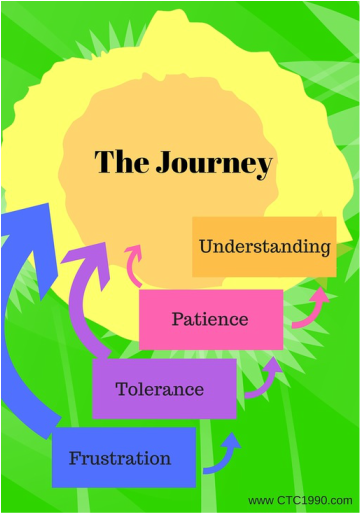
Recently I have been mulling on responses to complex kids ... responses in others that I recognize in my past and sometimes in my present.
My own journey (still on it!) has been a series of emotional steps and philosophical perspectives. Each block in this poster continues to be a step in the path.
The arrows? These show how we move; step by step, or in some moments of grace, directly to understanding.
Understanding is the goal because it is with understanding that our interventions actually are effective!
What helps by-pass the long and sometimes painful step-by-step growth from frustration ... from tolerance ,,, from patience? Seeking understanding. To seek to understand the perspectives and the forces at play for this child/ youth can galvanize us to helpful solutions.
Seems obvious, doesn't it? However, we often have to manage the other side of the solution ... our own responses. Often I believe that I am in an "understanding" framework, but my own emotional responses and inner dialogue tell me differently. So the next question is ...
How do we know where we are?
Frustration: I feel angry, held back from what I need to do; I say (sometimes out loud!) "This can't be happening." "You are so ungrateful." "You are disrespectful." "This kid is doing this on purpose". "I am in the right here." "If only he would change." "Why isn't she different?" "I don't deserve this."
Tolerance: I feel disgust, sad, angry. I say "I can handle this for a moment." "This kid is not gonna
turn out to be anyone useful" "There is no hope for this kid. There is for me." "I am morally
on the high ground here" " I just need to get through this moment, and then I can breathe."
Patience: I feel resigned, hopeful, sad,. I say, "Oh well." "This moment will end.
I can breathe right now. " "I will figure this out ... eventually." "This kid is just in growth
mode." "This kid will figure it out eventually."
Understanding: I feel peaceful. I am happy, sad. I say, "How difficult." "This kid is
trying his/her best and does not have the skills to understand. That is unfortunate."
"Am I actually helping? What can I do to actually help?" "How can I keep myself
calm during this time?" "Where is the gift in this experience for me? for my own
growth and understanding?"
This journey, a very human journey, takes us to places inside that are undeveloped and needing maturity. This journey is one of courage, as we come to grips with what is present (within us as well), rather than focussing on what is not yet developed (again, within us as well!).
Most recently I have read that self-compassion is crucial for development. Perhaps for our development as adults who want to help complex children / youth.
How can we move to understanding? Some of the insights by Dr. Ross Greene and Dr. Stuart Ablon highlight the importance of the child's / youth's concern. Using this model I have noticed that the child/ youth often has concerns far outside of my own understanding. And sometimes these concerns seem incredibly meaningless and immature. Perhaps more understanding? Very immature concerns just point to where the young one currently lives. When I remember that my job is to help the child/youth move along in his/ her development, I am grateful for the increased understanding. It is easier to know where to start! And my interventions become for effective.
So I sojourn on, knowing that I am in the company of many other caring adults helping kids.
Slow and steady. Seeking understanding. Grateful for moments of peace.